Question #331
Introductory Info Case study -
This is a case study. Case studies are not timed separately. You can use as much exam time as you would like to complete each case. However, there may be additional case studies and sections on this exam. You must manage your time to ensure that you are able to complete all questions included on this exam in the time provided.
To answer the questions included in a case study, you will need to reference information that is provided in the case study. Case studies might contain exhibits and other resources that provide more information about the scenario that is described in the case study. Each question is independent of the other questions in this case study.
At the end of this case study, a review screen will appear. This screen allows you to review your answers and to make changes before you move to the next section of the exam. After you begin a new section, you cannot return to this section.
To start the case study -
To display the first question in this case study, click the Next button. Use the buttons in the left pane to explore the content of the case study before you answer the questions. Clicking these buttons displays information such as business requirements, existing environment, and problem statements. When you are ready to answer a question, click the Question button to return to the question.
Background -
Overview -
You are a developer for Contoso, Ltd. The company has a social networking website that is developed as a Single Page Application (SPA). The main web application for the social networking website loads user uploaded content from blob storage.
You are developing a solution to monitor uploaded data for inappropriate content. The following process occurs when users upload content by using the SPA:
* Messages are sent to ContentUploadService.
* Content is processed by ContentAnalysisService.
* After processing is complete, the content is posted to the social network or a rejection message is posted in its place.
The ContentAnalysisService is deployed with Azure Container Instances from a private Azure Container Registry named contosoimages.
The solution will use eight CPU cores.
Azure Active Directory -
Contoso, Ltd. uses Azure Active Directory (Azure AD) for both internal and guest accounts.
Requirements -
ContentAnalysisService -
The company's data science group built ContentAnalysisService which accepts user generated content as a string and returns a probable value for inappropriate content. Any values over a specific threshold must be reviewed by an employee of Contoso, Ltd.
You must create an Azure Function named CheckUserContent to perform the content checks.
Costs -
You must minimize costs for all Azure services.
Manual review -
To review content, the user must authenticate to the website portion of the ContentAnalysisService using their Azure AD credentials. The website is built using
React and all pages and API endpoints require authentication. In order to review content a user must be part of a ContentReviewer role. All completed reviews must include the reviewer's email address for auditing purposes.
High availability -
All services must run in multiple regions. The failure of any service in a region must not impact overall application availability.
Monitoring -
An alert must be raised if the ContentUploadService uses more than 80 percent of available CPU cores.
Security -
You have the following security requirements:
Any web service accessible over the Internet must be protected from cross site scripting attacks.
All websites and services must use SSL from a valid root certificate authority.
Azure Storage access keys must only be stored in memory and must be available only to the service.
All Internal services must only be accessible from internal Virtual Networks (VNets).
All parts of the system must support inbound and outbound traffic restrictions.
All service calls must be authenticated by using Azure AD.
User agreements -
When a user submits content, they must agree to a user agreement. The agreement allows employees of Contoso, Ltd. to review content, store cookies on user devices, and track user's IP addresses.
Information regarding agreements is used by multiple divisions within Contoso, Ltd.
User responses must not be lost and must be available to all parties regardless of individual service uptime. The volume of agreements is expected to be in the millions per hour.
Validation testing -
When a new version of the ContentAnalysisService is available the previous seven days of content must be processed with the new version to verify that the new version does not significantly deviate from the old version.
Issues -
Users of the ContentUploadService report that they occasionally see HTTP 502 responses on specific pages.
Code -
ContentUploadService -
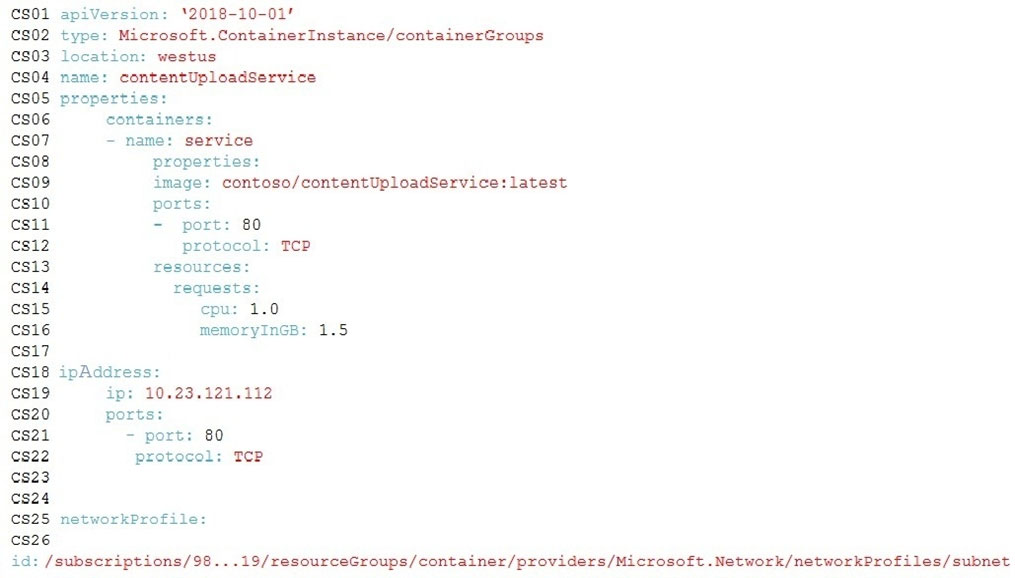
ApplicationManifest -
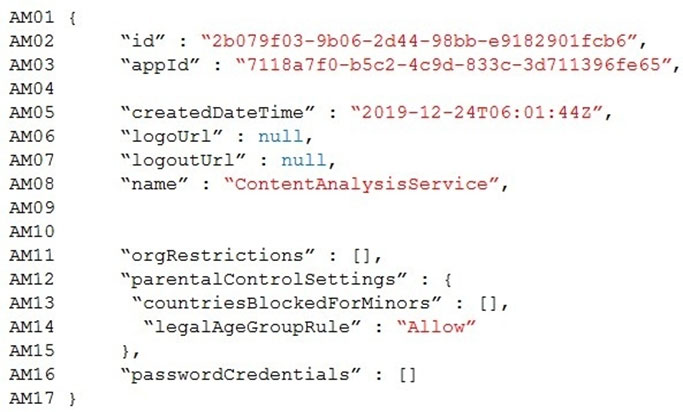 Question HOTSPOT -
Question HOTSPOT -
You need to implement the bindings for the CheckUserContent function.
How should you complete the code segment? To answer, select the appropriate options in the answer area.
NOTE: Each correct selection is worth one point.
Hot Area:
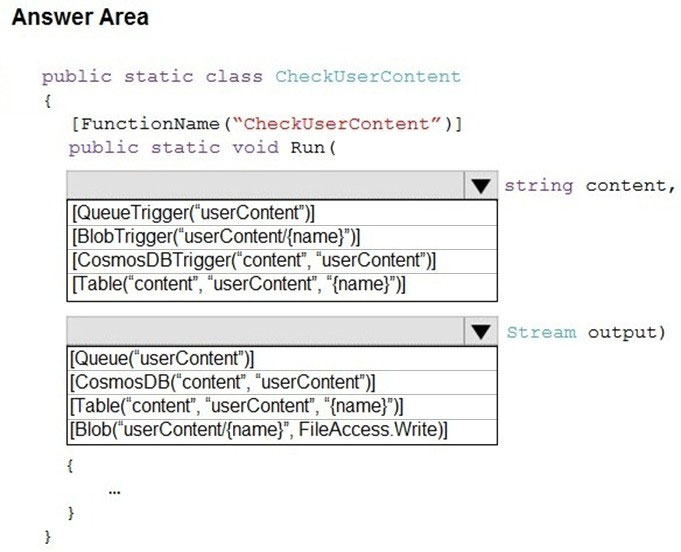
This is a case study. Case studies are not timed separately. You can use as much exam time as you would like to complete each case. However, there may be additional case studies and sections on this exam. You must manage your time to ensure that you are able to complete all questions included on this exam in the time provided.
To answer the questions included in a case study, you will need to reference information that is provided in the case study. Case studies might contain exhibits and other resources that provide more information about the scenario that is described in the case study. Each question is independent of the other questions in this case study.
At the end of this case study, a review screen will appear. This screen allows you to review your answers and to make changes before you move to the next section of the exam. After you begin a new section, you cannot return to this section.
To start the case study -
To display the first question in this case study, click the Next button. Use the buttons in the left pane to explore the content of the case study before you answer the questions. Clicking these buttons displays information such as business requirements, existing environment, and problem statements. When you are ready to answer a question, click the Question button to return to the question.
Background -
Overview -
You are a developer for Contoso, Ltd. The company has a social networking website that is developed as a Single Page Application (SPA). The main web application for the social networking website loads user uploaded content from blob storage.
You are developing a solution to monitor uploaded data for inappropriate content. The following process occurs when users upload content by using the SPA:
* Messages are sent to ContentUploadService.
* Content is processed by ContentAnalysisService.
* After processing is complete, the content is posted to the social network or a rejection message is posted in its place.
The ContentAnalysisService is deployed with Azure Container Instances from a private Azure Container Registry named contosoimages.
The solution will use eight CPU cores.
Azure Active Directory -
Contoso, Ltd. uses Azure Active Directory (Azure AD) for both internal and guest accounts.
Requirements -
ContentAnalysisService -
The company's data science group built ContentAnalysisService which accepts user generated content as a string and returns a probable value for inappropriate content. Any values over a specific threshold must be reviewed by an employee of Contoso, Ltd.
You must create an Azure Function named CheckUserContent to perform the content checks.
Costs -
You must minimize costs for all Azure services.
Manual review -
To review content, the user must authenticate to the website portion of the ContentAnalysisService using their Azure AD credentials. The website is built using
React and all pages and API endpoints require authentication. In order to review content a user must be part of a ContentReviewer role. All completed reviews must include the reviewer's email address for auditing purposes.
High availability -
All services must run in multiple regions. The failure of any service in a region must not impact overall application availability.
Monitoring -
An alert must be raised if the ContentUploadService uses more than 80 percent of available CPU cores.
Security -
You have the following security requirements:
Any web service accessible over the Internet must be protected from cross site scripting attacks.
All websites and services must use SSL from a valid root certificate authority.
Azure Storage access keys must only be stored in memory and must be available only to the service.
All Internal services must only be accessible from internal Virtual Networks (VNets).
All parts of the system must support inbound and outbound traffic restrictions.
All service calls must be authenticated by using Azure AD.
User agreements -
When a user submits content, they must agree to a user agreement. The agreement allows employees of Contoso, Ltd. to review content, store cookies on user devices, and track user's IP addresses.
Information regarding agreements is used by multiple divisions within Contoso, Ltd.
User responses must not be lost and must be available to all parties regardless of individual service uptime. The volume of agreements is expected to be in the millions per hour.
Validation testing -
When a new version of the ContentAnalysisService is available the previous seven days of content must be processed with the new version to verify that the new version does not significantly deviate from the old version.
Issues -
Users of the ContentUploadService report that they occasionally see HTTP 502 responses on specific pages.
Code -
ContentUploadService -

ApplicationManifest -
 Question HOTSPOT -
Question HOTSPOT -You need to implement the bindings for the CheckUserContent function.
How should you complete the code segment? To answer, select the appropriate options in the answer area.
NOTE: Each correct selection is worth one point.
Hot Area:

Question #332
Introductory Info Case study -
This is a case study. Case studies are not timed separately. You can use as much exam time as you would like to complete each case. However, there may be additional case studies and sections on this exam. You must manage your time to ensure that you are able to complete all questions included on this exam in the time provided.
To answer the questions included in a case study, you will need to reference information that is provided in the case study. Case studies might contain exhibits and other resources that provide more information about the scenario that is described in the case study. Each question is independent of the other questions in this case study.
At the end of this case study, a review screen will appear. This screen allows you to review your answers and to make changes before you move to the next section of the exam. After you begin a new section, you cannot return to this section.
To start the case study -
To display the first question in this case study, click the Next button. Use the buttons in the left pane to explore the content of the case study before you answer the questions. Clicking these buttons displays information such as business requirements, existing environment, and problem statements. When you are ready to answer a question, click the Question button to return to the question.
Background -
Overview -
You are a developer for Contoso, Ltd. The company has a social networking website that is developed as a Single Page Application (SPA). The main web application for the social networking website loads user uploaded content from blob storage.
You are developing a solution to monitor uploaded data for inappropriate content. The following process occurs when users upload content by using the SPA:
* Messages are sent to ContentUploadService.
* Content is processed by ContentAnalysisService.
* After processing is complete, the content is posted to the social network or a rejection message is posted in its place.
The ContentAnalysisService is deployed with Azure Container Instances from a private Azure Container Registry named contosoimages.
The solution will use eight CPU cores.
Azure Active Directory -
Contoso, Ltd. uses Azure Active Directory (Azure AD) for both internal and guest accounts.
Requirements -
ContentAnalysisService -
The company's data science group built ContentAnalysisService which accepts user generated content as a string and returns a probable value for inappropriate content. Any values over a specific threshold must be reviewed by an employee of Contoso, Ltd.
You must create an Azure Function named CheckUserContent to perform the content checks.
Costs -
You must minimize costs for all Azure services.
Manual review -
To review content, the user must authenticate to the website portion of the ContentAnalysisService using their Azure AD credentials. The website is built using
React and all pages and API endpoints require authentication. In order to review content a user must be part of a ContentReviewer role. All completed reviews must include the reviewer's email address for auditing purposes.
High availability -
All services must run in multiple regions. The failure of any service in a region must not impact overall application availability.
Monitoring -
An alert must be raised if the ContentUploadService uses more than 80 percent of available CPU cores.
Security -
You have the following security requirements:
Any web service accessible over the Internet must be protected from cross site scripting attacks.
All websites and services must use SSL from a valid root certificate authority.
Azure Storage access keys must only be stored in memory and must be available only to the service.
All Internal services must only be accessible from internal Virtual Networks (VNets).
All parts of the system must support inbound and outbound traffic restrictions.
All service calls must be authenticated by using Azure AD.
User agreements -
When a user submits content, they must agree to a user agreement. The agreement allows employees of Contoso, Ltd. to review content, store cookies on user devices, and track user's IP addresses.
Information regarding agreements is used by multiple divisions within Contoso, Ltd.
User responses must not be lost and must be available to all parties regardless of individual service uptime. The volume of agreements is expected to be in the millions per hour.
Validation testing -
When a new version of the ContentAnalysisService is available the previous seven days of content must be processed with the new version to verify that the new version does not significantly deviate from the old version.
Issues -
Users of the ContentUploadService report that they occasionally see HTTP 502 responses on specific pages.
Code -
ContentUploadService -
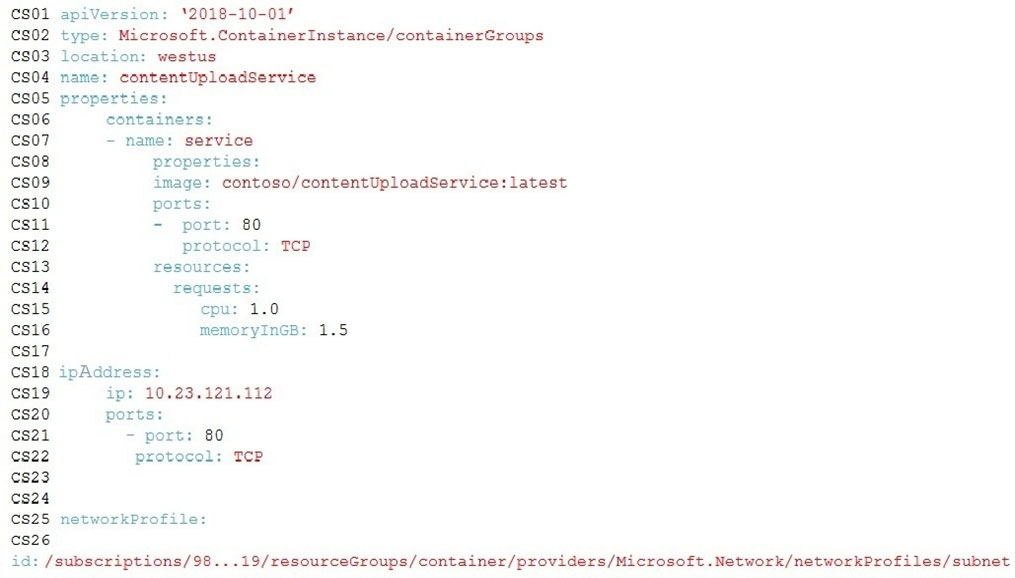
ApplicationManifest -
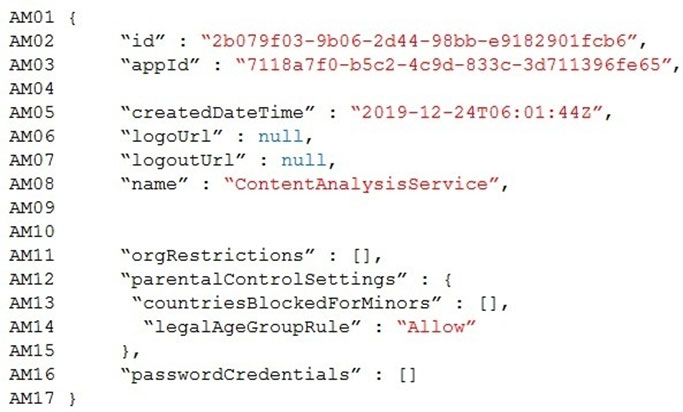 Question You need to configure the ContentUploadService deployment.
Question You need to configure the ContentUploadService deployment.
Which two actions should you perform? Each correct answer presents part of the solution.
NOTE: Each correct selection is worth one point.
This is a case study. Case studies are not timed separately. You can use as much exam time as you would like to complete each case. However, there may be additional case studies and sections on this exam. You must manage your time to ensure that you are able to complete all questions included on this exam in the time provided.
To answer the questions included in a case study, you will need to reference information that is provided in the case study. Case studies might contain exhibits and other resources that provide more information about the scenario that is described in the case study. Each question is independent of the other questions in this case study.
At the end of this case study, a review screen will appear. This screen allows you to review your answers and to make changes before you move to the next section of the exam. After you begin a new section, you cannot return to this section.
To start the case study -
To display the first question in this case study, click the Next button. Use the buttons in the left pane to explore the content of the case study before you answer the questions. Clicking these buttons displays information such as business requirements, existing environment, and problem statements. When you are ready to answer a question, click the Question button to return to the question.
Background -
Overview -
You are a developer for Contoso, Ltd. The company has a social networking website that is developed as a Single Page Application (SPA). The main web application for the social networking website loads user uploaded content from blob storage.
You are developing a solution to monitor uploaded data for inappropriate content. The following process occurs when users upload content by using the SPA:
* Messages are sent to ContentUploadService.
* Content is processed by ContentAnalysisService.
* After processing is complete, the content is posted to the social network or a rejection message is posted in its place.
The ContentAnalysisService is deployed with Azure Container Instances from a private Azure Container Registry named contosoimages.
The solution will use eight CPU cores.
Azure Active Directory -
Contoso, Ltd. uses Azure Active Directory (Azure AD) for both internal and guest accounts.
Requirements -
ContentAnalysisService -
The company's data science group built ContentAnalysisService which accepts user generated content as a string and returns a probable value for inappropriate content. Any values over a specific threshold must be reviewed by an employee of Contoso, Ltd.
You must create an Azure Function named CheckUserContent to perform the content checks.
Costs -
You must minimize costs for all Azure services.
Manual review -
To review content, the user must authenticate to the website portion of the ContentAnalysisService using their Azure AD credentials. The website is built using
React and all pages and API endpoints require authentication. In order to review content a user must be part of a ContentReviewer role. All completed reviews must include the reviewer's email address for auditing purposes.
High availability -
All services must run in multiple regions. The failure of any service in a region must not impact overall application availability.
Monitoring -
An alert must be raised if the ContentUploadService uses more than 80 percent of available CPU cores.
Security -
You have the following security requirements:
Any web service accessible over the Internet must be protected from cross site scripting attacks.
All websites and services must use SSL from a valid root certificate authority.
Azure Storage access keys must only be stored in memory and must be available only to the service.
All Internal services must only be accessible from internal Virtual Networks (VNets).
All parts of the system must support inbound and outbound traffic restrictions.
All service calls must be authenticated by using Azure AD.
User agreements -
When a user submits content, they must agree to a user agreement. The agreement allows employees of Contoso, Ltd. to review content, store cookies on user devices, and track user's IP addresses.
Information regarding agreements is used by multiple divisions within Contoso, Ltd.
User responses must not be lost and must be available to all parties regardless of individual service uptime. The volume of agreements is expected to be in the millions per hour.
Validation testing -
When a new version of the ContentAnalysisService is available the previous seven days of content must be processed with the new version to verify that the new version does not significantly deviate from the old version.
Issues -
Users of the ContentUploadService report that they occasionally see HTTP 502 responses on specific pages.
Code -
ContentUploadService -

ApplicationManifest -
 Question You need to configure the ContentUploadService deployment.
Question You need to configure the ContentUploadService deployment.Which two actions should you perform? Each correct answer presents part of the solution.
NOTE: Each correct selection is worth one point.
Question #333
Introductory Info Case study -
This is a case study. Case studies are not timed separately. You can use as much exam time as you would like to complete each case. However, there may be additional case studies and sections on this exam. You must manage your time to ensure that you are able to complete all questions included on this exam in the time provided.
To answer the questions included in a case study, you will need to reference information that is provided in the case study. Case studies might contain exhibits and other resources that provide more information about the scenario that is described in the case study. Each question is independent of the other questions in this case study.
At the end of this case study, a review screen will appear. This screen allows you to review your answers and to make changes before you move to the next section of the exam. After you begin a new section, you cannot return to this section.
To start the case study -
To display the first question in this case study, click the Next button. Use the buttons in the left pane to explore the content of the case study before you answer the questions. Clicking these buttons displays information such as business requirements, existing environment, and problem statements. When you are ready to answer a question, click the Question button to return to the question.
Background -
City Power & Light company provides electrical infrastructure monitoring solutions for homes and businesses. The company is migrating solutions to Azure.
Current environment -
Architecture overview -
The company has a public website located at http://www.cpandl.com/. The site is a single-page web application that runs in Azure App Service on Linux. The website uses files stored in Azure Storage and cached in Azure Content Delivery Network (CDN) to serve static content.
API Management and Azure Function App functions are used to process and store data in Azure Database for PostgreSQL. API Management is used to broker communications to the Azure Function app functions for Logic app integration. Logic apps are used to orchestrate the data processing while Service Bus and
Event Grid handle messaging and events.
The solution uses Application Insights, Azure Monitor, and Azure Key Vault.
Architecture diagram -
The company has several applications and services that support their business. The company plans to implement serverless computing where possible. The overall architecture is shown below.
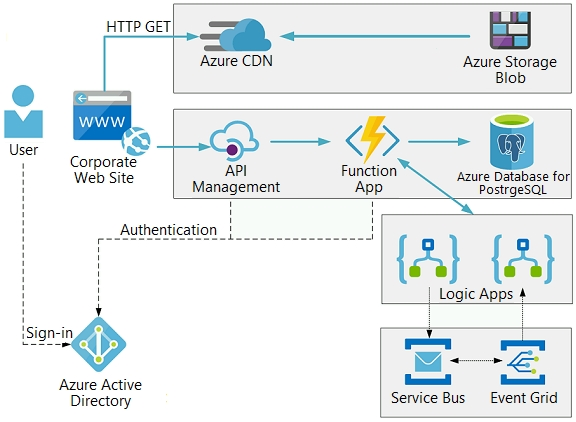
User authentication -
The following steps detail the user authentication process:
1. The user selects Sign in in the website.
2. The browser redirects the user to the Azure Active Directory (Azure AD) sign in page.
3. The user signs in.
4. Azure AD redirects the user's session back to the web application. The URL includes an access token.
5. The web application calls an API and includes the access token in the authentication header. The application ID is sent as the audience ('aud') claim in the access token.
6. The back-end API validates the access token.
Requirements -
Corporate website -
Communications and content must be secured by using SSL.
Communications must use HTTPS.
Data must be replicated to a secondary region and three availability zones.
Data storage costs must be minimized.
Azure Database for PostgreSQL -
The database connection string is stored in Azure Key Vault with the following attributes:
Azure Key Vault name: cpandlkeyvault
Secret name: PostgreSQLConn
Id: 80df3e46ffcd4f1cb187f79905e9a1e8
The connection information is updated frequently. The application must always use the latest information to connect to the database.
Azure Service Bus and Azure Event Grid
Azure Event Grid must use Azure Service Bus for queue-based load leveling.
Events in Azure Event Grid must be routed directly to Service Bus queues for use in buffering.
Events from Azure Service Bus and other Azure services must continue to be routed to Azure Event Grid for processing.
Security -
All SSL certificates and credentials must be stored in Azure Key Vault.
File access must restrict access by IP, protocol, and Azure AD rights.
All user accounts and processes must receive only those privileges which are essential to perform their intended function.
Compliance -
Auditing of the file updates and transfers must be enabled to comply with General Data Protection Regulation (GDPR). The file updates must be read-only, stored in the order in which they occurred, include only create, update, delete, and copy operations, and be retained for compliance reasons.
Issues -
Corporate website -
While testing the site, the following error message displays:
CryptographicException: The system cannot find the file specified.
Function app -
You perform local testing for the RequestUserApproval function. The following error message displays:
'Timeout value of 00:10:00 exceeded by function: RequestUserApproval'
The same error message displays when you test the function in an Azure development environment when you run the following Kusto query:
FunctionAppLogs -
| where FunctionName = = "RequestUserApproval"
Logic app -
You test the Logic app in a development environment. The following error message displays:
'400 Bad Request'
Troubleshooting of the error shows an HttpTrigger action to call the RequestUserApproval function.
Code -
Corporate website -
Security.cs:

Function app -
RequestUserApproval.cs:
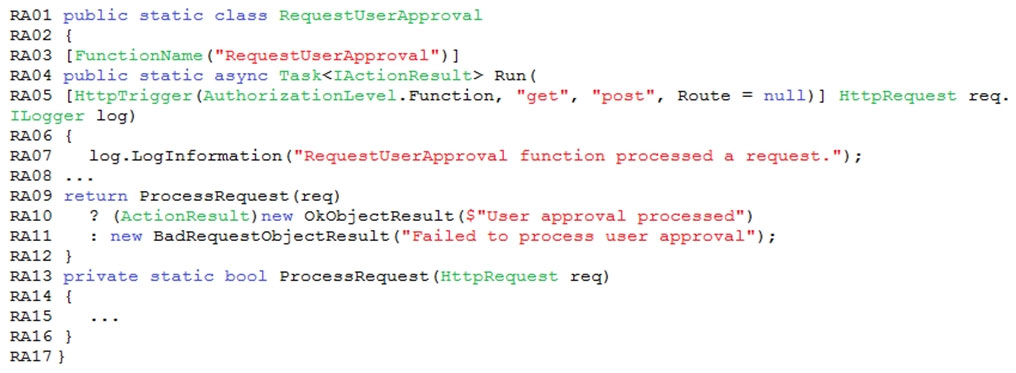 Question HOTSPOT -
Question HOTSPOT -
You need to configure the Account Kind, Replication, and Access tier options for the corporate website's Azure Storage account.
How should you complete the configuration? To answer, select the appropriate options in the dialog box in the answer area.
NOTE: Each correct selection is worth one point.
Hot Area:
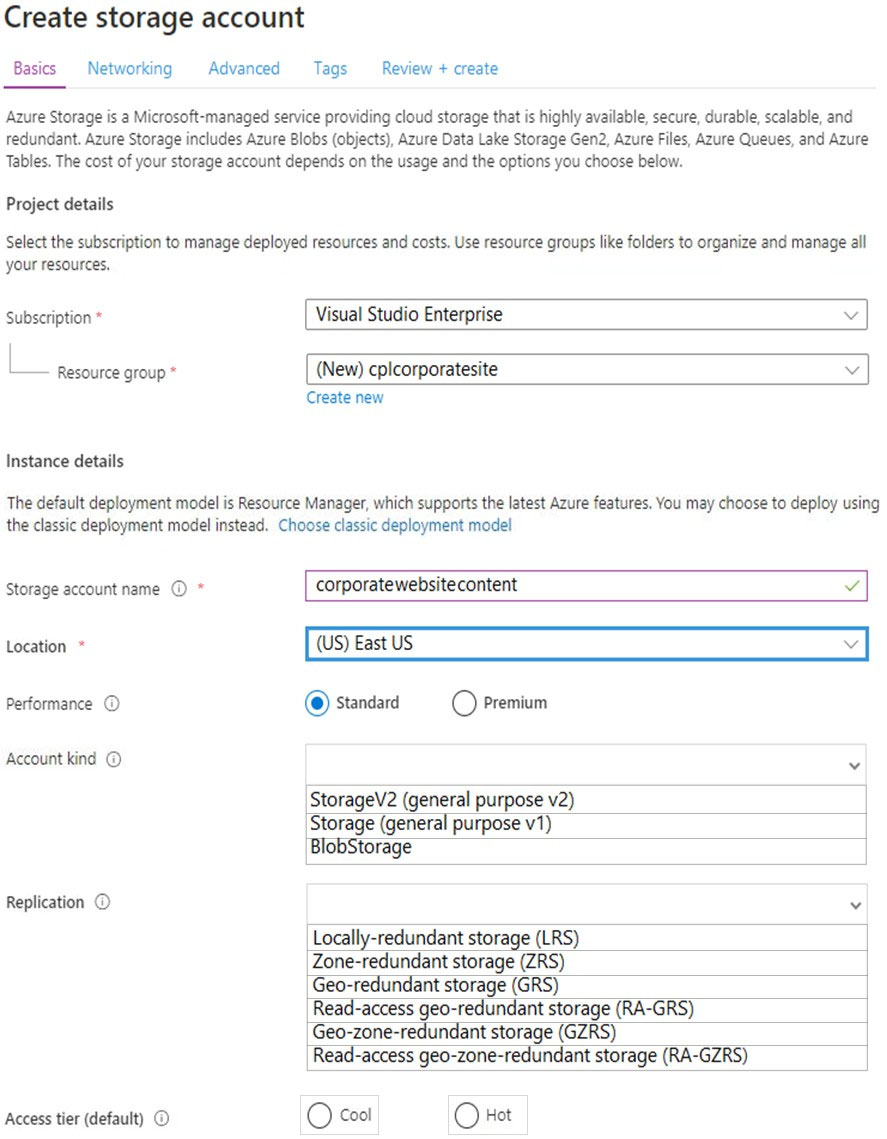
This is a case study. Case studies are not timed separately. You can use as much exam time as you would like to complete each case. However, there may be additional case studies and sections on this exam. You must manage your time to ensure that you are able to complete all questions included on this exam in the time provided.
To answer the questions included in a case study, you will need to reference information that is provided in the case study. Case studies might contain exhibits and other resources that provide more information about the scenario that is described in the case study. Each question is independent of the other questions in this case study.
At the end of this case study, a review screen will appear. This screen allows you to review your answers and to make changes before you move to the next section of the exam. After you begin a new section, you cannot return to this section.
To start the case study -
To display the first question in this case study, click the Next button. Use the buttons in the left pane to explore the content of the case study before you answer the questions. Clicking these buttons displays information such as business requirements, existing environment, and problem statements. When you are ready to answer a question, click the Question button to return to the question.
Background -
City Power & Light company provides electrical infrastructure monitoring solutions for homes and businesses. The company is migrating solutions to Azure.
Current environment -
Architecture overview -
The company has a public website located at http://www.cpandl.com/. The site is a single-page web application that runs in Azure App Service on Linux. The website uses files stored in Azure Storage and cached in Azure Content Delivery Network (CDN) to serve static content.
API Management and Azure Function App functions are used to process and store data in Azure Database for PostgreSQL. API Management is used to broker communications to the Azure Function app functions for Logic app integration. Logic apps are used to orchestrate the data processing while Service Bus and
Event Grid handle messaging and events.
The solution uses Application Insights, Azure Monitor, and Azure Key Vault.
Architecture diagram -
The company has several applications and services that support their business. The company plans to implement serverless computing where possible. The overall architecture is shown below.

User authentication -
The following steps detail the user authentication process:
1. The user selects Sign in in the website.
2. The browser redirects the user to the Azure Active Directory (Azure AD) sign in page.
3. The user signs in.
4. Azure AD redirects the user's session back to the web application. The URL includes an access token.
5. The web application calls an API and includes the access token in the authentication header. The application ID is sent as the audience ('aud') claim in the access token.
6. The back-end API validates the access token.
Requirements -
Corporate website -
Communications and content must be secured by using SSL.
Communications must use HTTPS.
Data must be replicated to a secondary region and three availability zones.
Data storage costs must be minimized.
Azure Database for PostgreSQL -
The database connection string is stored in Azure Key Vault with the following attributes:
Azure Key Vault name: cpandlkeyvault
Secret name: PostgreSQLConn
Id: 80df3e46ffcd4f1cb187f79905e9a1e8
The connection information is updated frequently. The application must always use the latest information to connect to the database.
Azure Service Bus and Azure Event Grid
Azure Event Grid must use Azure Service Bus for queue-based load leveling.
Events in Azure Event Grid must be routed directly to Service Bus queues for use in buffering.
Events from Azure Service Bus and other Azure services must continue to be routed to Azure Event Grid for processing.
Security -
All SSL certificates and credentials must be stored in Azure Key Vault.
File access must restrict access by IP, protocol, and Azure AD rights.
All user accounts and processes must receive only those privileges which are essential to perform their intended function.
Compliance -
Auditing of the file updates and transfers must be enabled to comply with General Data Protection Regulation (GDPR). The file updates must be read-only, stored in the order in which they occurred, include only create, update, delete, and copy operations, and be retained for compliance reasons.
Issues -
Corporate website -
While testing the site, the following error message displays:
CryptographicException: The system cannot find the file specified.
Function app -
You perform local testing for the RequestUserApproval function. The following error message displays:
'Timeout value of 00:10:00 exceeded by function: RequestUserApproval'
The same error message displays when you test the function in an Azure development environment when you run the following Kusto query:
FunctionAppLogs -
| where FunctionName = = "RequestUserApproval"
Logic app -
You test the Logic app in a development environment. The following error message displays:
'400 Bad Request'
Troubleshooting of the error shows an HttpTrigger action to call the RequestUserApproval function.
Code -
Corporate website -
Security.cs:

Function app -
RequestUserApproval.cs:
 Question HOTSPOT -
Question HOTSPOT -You need to configure the Account Kind, Replication, and Access tier options for the corporate website's Azure Storage account.
How should you complete the configuration? To answer, select the appropriate options in the dialog box in the answer area.
NOTE: Each correct selection is worth one point.
Hot Area:

Question #334
HOTSPOT
-
You are developing a web application that uses the Microsoft Identity platform for user and resource authentication. The web application called several REST APIs.
You are implementing various authentication and authorization flows for the web application.
You need to validate the claims in the authentication token.
Which token type should you use? To answer, select the appropriate options in the answer area.
NOTE: Each correct selection is worth one point.
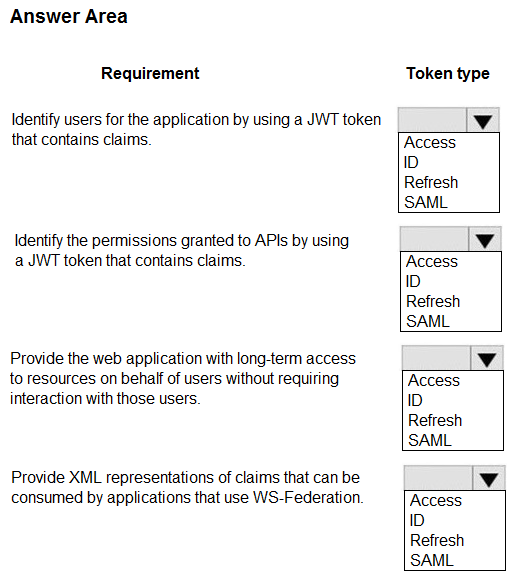
-
You are developing a web application that uses the Microsoft Identity platform for user and resource authentication. The web application called several REST APIs.
You are implementing various authentication and authorization flows for the web application.
You need to validate the claims in the authentication token.
Which token type should you use? To answer, select the appropriate options in the answer area.
NOTE: Each correct selection is worth one point.

Question #335
HOTSPOT
-
You are developing a content management application for technical manuals. The application is deployed as an Azure Static Web app.
Authenticated users can view pages under/manuals but only contributors can access the page /manuals/new.html.
You need to configure the routing for the web app.
How should you complete the configuration? To answer, select the appropriate options in the answer area.
NOTE: Each correct selection is worth one point.
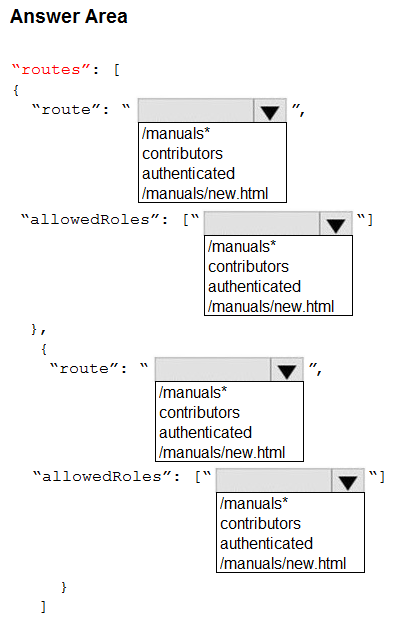
-
You are developing a content management application for technical manuals. The application is deployed as an Azure Static Web app.
Authenticated users can view pages under/manuals but only contributors can access the page /manuals/new.html.
You need to configure the routing for the web app.
How should you complete the configuration? To answer, select the appropriate options in the answer area.
NOTE: Each correct selection is worth one point.

Question #336
You are developing a web application that uses the Microsoft identity platform for user and resource authentication. The web application calls several REST APIs.
A REST API call must read the user’s calendar. The web application requires permission to send an email as the user.
You need to authorize the web application and the API.
Which parameter should you use?
A REST API call must read the user’s calendar. The web application requires permission to send an email as the user.
You need to authorize the web application and the API.
Which parameter should you use?
Question #337
HOTSPOT
-
You develop and deploy a web app to Azure App service. The web app allows users to authenticate by using social identity providers through the Azure B2C service. All user profile information is stored in Azure B2C.
You must update the web app to display common user properties from Azure B2C to include the following information:
• Email address
• Job title
• First name
• Last name
• Office location
You need to implement the user properties in the web app.
Which code library and API should you use? To answer, select the appropriate options in the answer area.
NOTE: Each correct selection is worth one point.
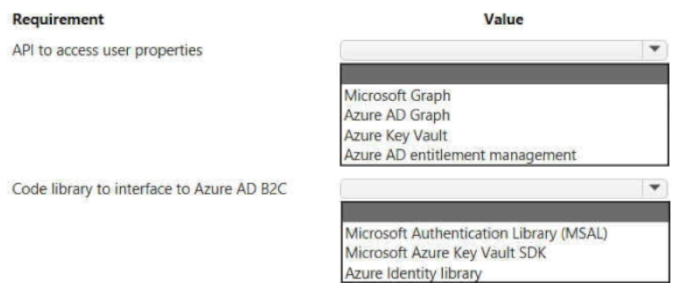
-
You develop and deploy a web app to Azure App service. The web app allows users to authenticate by using social identity providers through the Azure B2C service. All user profile information is stored in Azure B2C.
You must update the web app to display common user properties from Azure B2C to include the following information:
• Email address
• Job title
• First name
• Last name
• Office location
You need to implement the user properties in the web app.
Which code library and API should you use? To answer, select the appropriate options in the answer area.
NOTE: Each correct selection is worth one point.

Question #338
HOTSPOT
-
You develop and deploy the following staticwebapp.config.json file to the app_location value specified in the workflow file of an Azure Static Web app:

For each of the following statements, select Yes if the statement is true. Otherwise, select No.
NOTE: Each correct selection is worth one point.
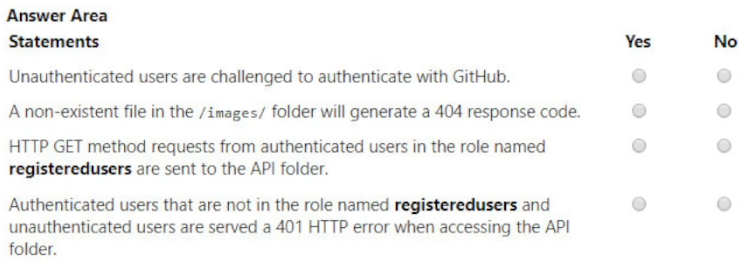
-
You develop and deploy the following staticwebapp.config.json file to the app_location value specified in the workflow file of an Azure Static Web app:

For each of the following statements, select Yes if the statement is true. Otherwise, select No.
NOTE: Each correct selection is worth one point.

Question #339
You develop and deploy an Azure App Service web app named App1. You create a new Azure Key Vault named Vault1. You import several API keys, passwords, certificates, and cryptographic keys into Vault1.
You need to grant App1 access to Vault1 and automatically rotate credentials. Credentials must not be stored in code.
What should you do?
You need to grant App1 access to Vault1 and automatically rotate credentials. Credentials must not be stored in code.
What should you do?
Question #340
You are developing a Java application to be deployed in Azure. The application stores sensitive data in Azure Cosmos DB.
You need to configure Always Encrypted to encrypt the sensitive data inside the application.
What should you do first?
You need to configure Always Encrypted to encrypt the sensitive data inside the application.
What should you do first?
Question #341
HOTSPOT
-
You develop a web app that interacts with Azure Active Directory (Azure AD) groups by using Microsoft Graph.
You build a web page that shows all Azure AD groups that are not of the type 'Unified'.
You need to build the Microsoft Graph query for the page.
How should you complete the query? To answer, select the appropriate options in the answer area.
NOTE: Each correct selection is worth one point.
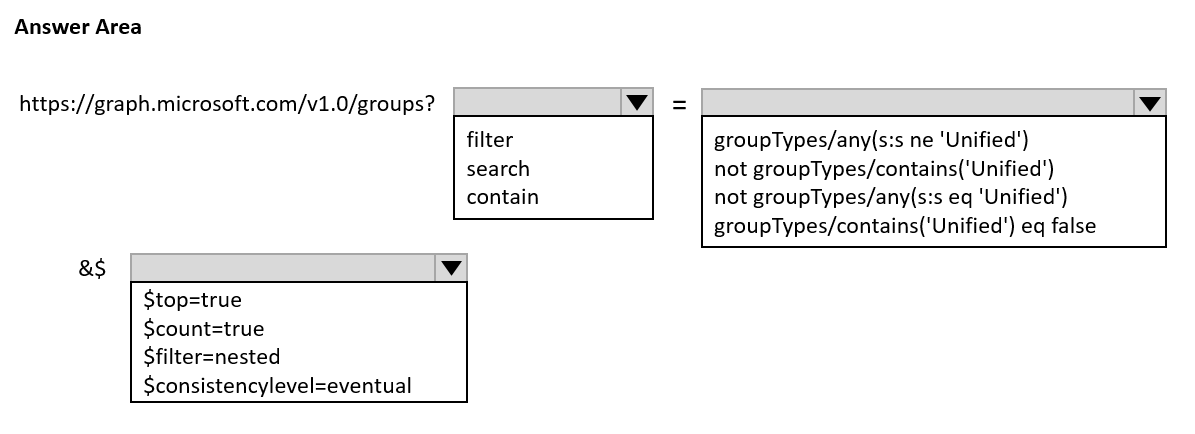
-
You develop a web app that interacts with Azure Active Directory (Azure AD) groups by using Microsoft Graph.
You build a web page that shows all Azure AD groups that are not of the type 'Unified'.
You need to build the Microsoft Graph query for the page.
How should you complete the query? To answer, select the appropriate options in the answer area.
NOTE: Each correct selection is worth one point.

Question #342
DRAG DROP
-
You are developing an Azure solution.
You need to develop code to access a secret stored in Azure Key Vault.
How should you complete the code segment? To answer, drag the appropriate code segments to the correct location. Each code segment may be used once, more than once, or not at all. You may need to drag the split bar between panes or scroll to view content.
NOTE: Each correct selection is worth one point.

-
You are developing an Azure solution.
You need to develop code to access a secret stored in Azure Key Vault.
How should you complete the code segment? To answer, drag the appropriate code segments to the correct location. Each code segment may be used once, more than once, or not at all. You may need to drag the split bar between panes or scroll to view content.
NOTE: Each correct selection is worth one point.

Question #343
HOTSPOT
-
You are a developer building a web site using a web app. The web site stores configuration data in Azure App Configuration.
Access to Azure App Configuration has been configured to use the identity of the web app for authentication. Security requirements specify that no other authentication systems must be used.
You need to load configuration data from Azure App Configuration.
How should you complete the code? To answer, select the appropriate options in the answer area.
NOTE: Each correct selection is worth one point.
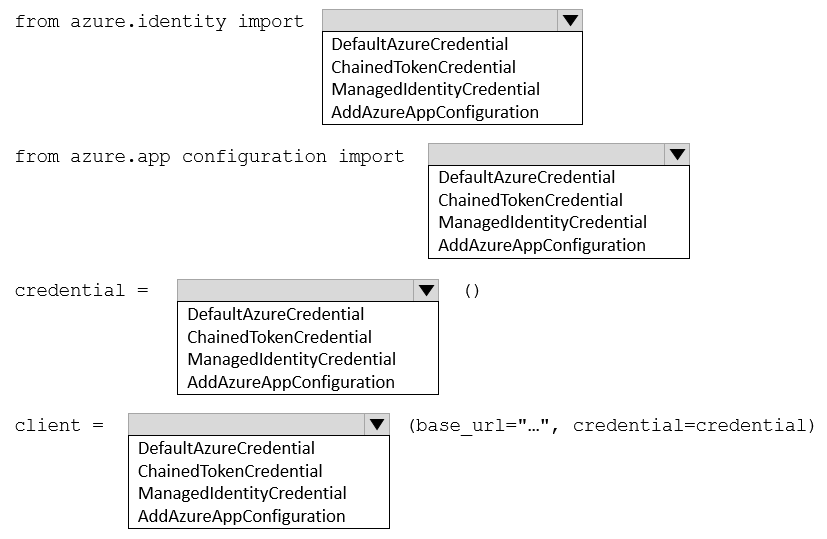
-
You are a developer building a web site using a web app. The web site stores configuration data in Azure App Configuration.
Access to Azure App Configuration has been configured to use the identity of the web app for authentication. Security requirements specify that no other authentication systems must be used.
You need to load configuration data from Azure App Configuration.
How should you complete the code? To answer, select the appropriate options in the answer area.
NOTE: Each correct selection is worth one point.

Question #344
You are developing an online game that includes a feature that allows players to interact with other players on the same team within a certain distance. The calculation to determine the players in range occurs when players move and are cached in an Azure Cache for Redis instance.
The system should prioritize players based on how recently they have moved and should not prioritize players who have logged out of the game.
You need to select an eviction policy.
Which eviction policy should you use?
The system should prioritize players based on how recently they have moved and should not prioritize players who have logged out of the game.
You need to select an eviction policy.
Which eviction policy should you use?
Question #345
You develop an Azure App Service web app and deploy to a production environment. You enable Application Insights for the web app.
The web app is throwing multiple exceptions in the environment.
You need to examine the state of the source code and variables when the exceptions are thrown.
Which Application Insights feature should you configure?
The web app is throwing multiple exceptions in the environment.
You need to examine the state of the source code and variables when the exceptions are thrown.
Which Application Insights feature should you configure?
Question #346
DRAG DROP
-
You develop and deploy a Java application to Azure. The application has been instrumented by using the Application Insights SDK.
The telemetry data must be enriched and processed before it is sent to the Application Insights service.
You need to modify the telemetry data.
Which Application Insights SDK features should you use? To answer, drag the appropriate features to the correct requirements. Each feature may be used once, more than once, or not at all. You may need to drag the split bar between panes or scroll to view content.
NOTE: Each correct selection is worth one point.

-
You develop and deploy a Java application to Azure. The application has been instrumented by using the Application Insights SDK.
The telemetry data must be enriched and processed before it is sent to the Application Insights service.
You need to modify the telemetry data.
Which Application Insights SDK features should you use? To answer, drag the appropriate features to the correct requirements. Each feature may be used once, more than once, or not at all. You may need to drag the split bar between panes or scroll to view content.
NOTE: Each correct selection is worth one point.

Question #347
HOTSPOT
-
You develop new functionality in a web application for a company that provides access to seismic data from around the world. The seismic data is stored in Redis Streams within an Azure Cache for Redis instance.
The new functionality includes a real-time display of seismic events as they occur.
You need to implement the Azure Cache for Redis command to receive seismic data.
How should you complete the command? To answer, select the appropriate options in the answer area.
NOTE: Each correct selection is worth one point.

-
You develop new functionality in a web application for a company that provides access to seismic data from around the world. The seismic data is stored in Redis Streams within an Azure Cache for Redis instance.
The new functionality includes a real-time display of seismic events as they occur.
You need to implement the Azure Cache for Redis command to receive seismic data.
How should you complete the command? To answer, select the appropriate options in the answer area.
NOTE: Each correct selection is worth one point.

Question #348
You develop an ASP.NET Core app that uses Azure App Configuration. You also create an App Configuration containing 100 settings.
The app must meet the following requirements:
• Ensure the consistency of all configuration data when changes to individual settings occur.
• Handle configuration data changes dynamically without causing the application to restart.
• Reduce the overall number of requests made to App Configuration APIs.
You must implement dynamic configuration updates in the app.
What are two ways to achieve this goal? Each correct answer presents part of the solution.
NOTE: Each correct selection is worth one point.
The app must meet the following requirements:
• Ensure the consistency of all configuration data when changes to individual settings occur.
• Handle configuration data changes dynamically without causing the application to restart.
• Reduce the overall number of requests made to App Configuration APIs.
You must implement dynamic configuration updates in the app.
What are two ways to achieve this goal? Each correct answer presents part of the solution.
NOTE: Each correct selection is worth one point.
Question #349
HOTSPOT
-
You develop an image upload service that is exposed using Azure API Management. Images are analyzed after upload for automatic tagging.
Images over 500 KB are processed by a different backend that offers a lower tier of service that costs less money. The lower tier of service is denoted by a header named x-large-request. Images over 500 KB must never be processed by backends for smaller images and must always be charged the lower price.
You need to implement API Management policies to ensure that images are processed correctly.
How should you complete the API Management inbound policy? To answer, select the appropriate options in the answer area.
NOTE: Each correct selection is worth one point.
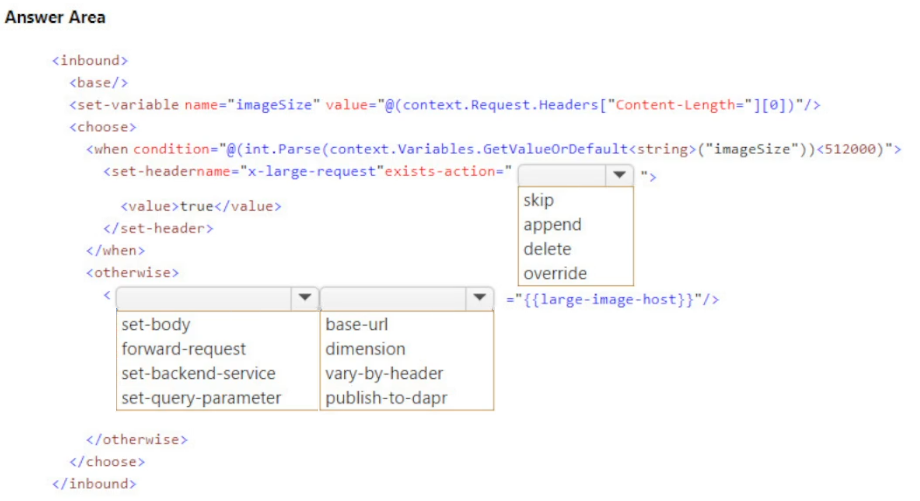
-
You develop an image upload service that is exposed using Azure API Management. Images are analyzed after upload for automatic tagging.
Images over 500 KB are processed by a different backend that offers a lower tier of service that costs less money. The lower tier of service is denoted by a header named x-large-request. Images over 500 KB must never be processed by backends for smaller images and must always be charged the lower price.
You need to implement API Management policies to ensure that images are processed correctly.
How should you complete the API Management inbound policy? To answer, select the appropriate options in the answer area.
NOTE: Each correct selection is worth one point.

Question #350
HOTSPOT
-
You develop several Azure Functions app functions to process JSON documents from a third-party system. The third-party system publishes events to Azure Event Grid to include hundreds of event types, such as billing, inventory, and shipping updates.
Events must be sent to a single endpoint for the Azure Functions app to process. The events must be filtered by event type before processing. You must have authorization and authentication control to partition your tenants to receive the event data.
You need to configure Azure Event Grid.
Which configuration should you use? To answer, select the appropriate values in the answer area.
NOTE: Each correct selection is worth one point.
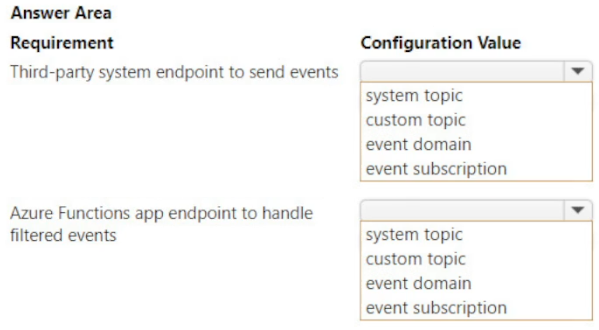
-
You develop several Azure Functions app functions to process JSON documents from a third-party system. The third-party system publishes events to Azure Event Grid to include hundreds of event types, such as billing, inventory, and shipping updates.
Events must be sent to a single endpoint for the Azure Functions app to process. The events must be filtered by event type before processing. You must have authorization and authentication control to partition your tenants to receive the event data.
You need to configure Azure Event Grid.
Which configuration should you use? To answer, select the appropriate values in the answer area.
NOTE: Each correct selection is worth one point.

Question #351
A company is developing a solution that allows smart refrigerators to send temperature information to a central location.
The solution must receive and store messages until they can be processed. You create an Azure Service Bus instance by providing a name, pricing tier, subscription, resource group, and location.
You need to complete the configuration.
Which Azure CLI or PowerShell command should you run?
The solution must receive and store messages until they can be processed. You create an Azure Service Bus instance by providing a name, pricing tier, subscription, resource group, and location.
You need to complete the configuration.
Which Azure CLI or PowerShell command should you run?
Question #352
You are developing several microservices to deploy to a new Azure Kubernetes Service cluster. The microservices manage data stored in Azure Cosmos DB and Azure Blob storage. The data is secured by using customer-managed keys stored in Azure Key Vault.
You must automate key rotation for all Azure Key Vault keys and allow for manual key rotation. Keys must rotate every three months. Notifications of expiring keys must be sent before key expiry.
You need to configure key rotation and enable key expiry notifications.
Which two actions should you perform? Each correct answer presents part of the solution.
NOTE: Each correct selection is worth one point.
You must automate key rotation for all Azure Key Vault keys and allow for manual key rotation. Keys must rotate every three months. Notifications of expiring keys must be sent before key expiry.
You need to configure key rotation and enable key expiry notifications.
Which two actions should you perform? Each correct answer presents part of the solution.
NOTE: Each correct selection is worth one point.
Question #353
HOTSPOT
-
You develop and deploy an Azure App Service web app that connects to Azure Cache for Redis as a content cache. All resources have been deployed to the East US 2 region.
The security team requires the following audit information from Azure Cache for Redis:
• The number of Redis client connections from an associated IP address.
• Redis operations completed on the content cache.
• The location (region) in which the Azure Cach3e for Redis instance was accessed.
The audit information must be captured and analyzed by a security team application deployed to the Central US region.
You need to log information on all client connections to the cache.
Which configuration values should you use? To answer, select the appropriate options in the answer area.
NOTE: Each correct selection is worth one point.
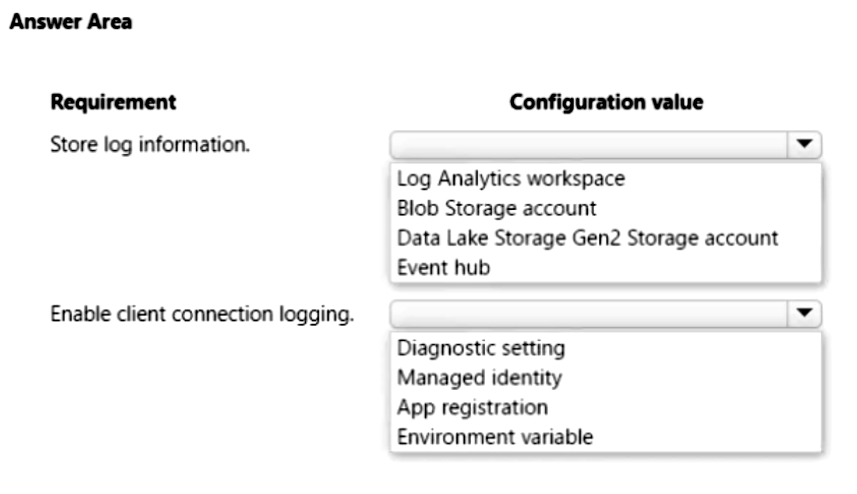
-
You develop and deploy an Azure App Service web app that connects to Azure Cache for Redis as a content cache. All resources have been deployed to the East US 2 region.
The security team requires the following audit information from Azure Cache for Redis:
• The number of Redis client connections from an associated IP address.
• Redis operations completed on the content cache.
• The location (region) in which the Azure Cach3e for Redis instance was accessed.
The audit information must be captured and analyzed by a security team application deployed to the Central US region.
You need to log information on all client connections to the cache.
Which configuration values should you use? To answer, select the appropriate options in the answer area.
NOTE: Each correct selection is worth one point.

Question #354
You develop and deploy a web app to Azure App Service. The Azure App Service uses a Basic plan in a single region.
Users report that the web app is responding slow. You must capture the complete call stack to help identify performance issues in the code. Call stack data must be correlated across app instances. You must minimize cost and impact to users on the web app.
You need to capture the telemetry.
Which three actions should you perform? Each correct answer presents part of the solution.
NOTE: Each correct selection is worth one point.
Users report that the web app is responding slow. You must capture the complete call stack to help identify performance issues in the code. Call stack data must be correlated across app instances. You must minimize cost and impact to users on the web app.
You need to capture the telemetry.
Which three actions should you perform? Each correct answer presents part of the solution.
NOTE: Each correct selection is worth one point.
Question #355
You are building an application to track cell towers that are available to phones in near real time. A phone will send information to the application by using the Azure Web PubSub service. The data will be processed by using an Azure Functions app. Traffic will be transmitted by using a content delivery network (CDN).
The Azure function must be protected against misconfigured or unauthorized invocations.
You need to ensure that the CDN allows for the Azure function protection.
Which HTTP header should be on the allowed list?
The Azure function must be protected against misconfigured or unauthorized invocations.
You need to ensure that the CDN allows for the Azure function protection.
Which HTTP header should be on the allowed list?
Question #356
A company is developing a solution that allows smart refrigerators to send temperature information to a central location.
The solution must receive and store messages until they can be processed. You create an Azure Service Bus instance by providing a name, pricing tier, subscription, resource group, and location.
You need to complete the configuration.
Which Azure CLI or PowerShell command should you run?
The solution must receive and store messages until they can be processed. You create an Azure Service Bus instance by providing a name, pricing tier, subscription, resource group, and location.
You need to complete the configuration.
Which Azure CLI or PowerShell command should you run?
Question #357
A company is developing a solution that allows smart refrigerators to send temperature information to a central location.
The solution must receive and store messages until they can be processed. You create an Azure Service Bus instance by providing a name, pricing tier, subscription, resource group, and location.
You need to complete the configuration.
Which Azure CLI or PowerShell command should you run?
The solution must receive and store messages until they can be processed. You create an Azure Service Bus instance by providing a name, pricing tier, subscription, resource group, and location.
You need to complete the configuration.
Which Azure CLI or PowerShell command should you run?
Question #358
DRAG DROP
-
You develop and deploy several APIs to Azure API Management.
You create the following policy fragment named APICounts:

The policy fragment must be reused across various scopes and APIs. The policy fragment must be applied to all APIs and run when a calling system invokes any API.
You need to implement the policy fragment.

-
You develop and deploy several APIs to Azure API Management.
You create the following policy fragment named APICounts:

The policy fragment must be reused across various scopes and APIs. The policy fragment must be applied to all APIs and run when a calling system invokes any API.
You need to implement the policy fragment.

Question #360
You are developing a web application that uses the Microsoft identity platform to authenticate users and resources. The web application calls several REST APIs.
The APIs require an access token from the Microsoft identity platform.
You need to request a token.
Which three properties should you use? Each correct answer presents part of the solution.
NOTE: Each correct selection is worth one point.
The APIs require an access token from the Microsoft identity platform.
You need to request a token.
Which three properties should you use? Each correct answer presents part of the solution.
NOTE: Each correct selection is worth one point.
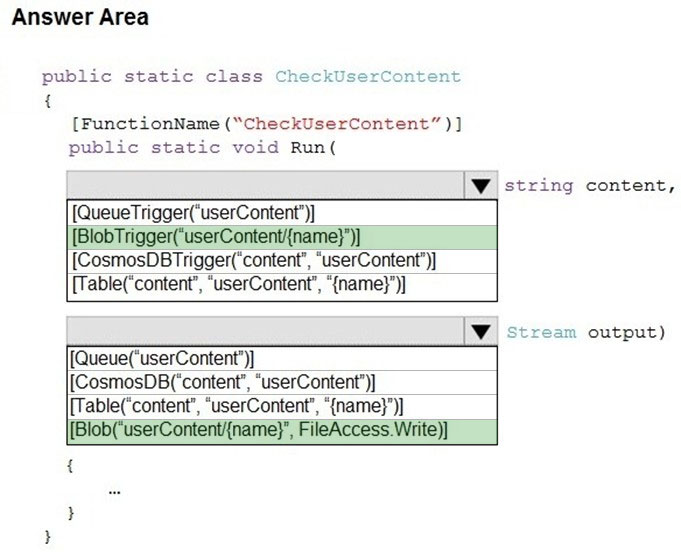
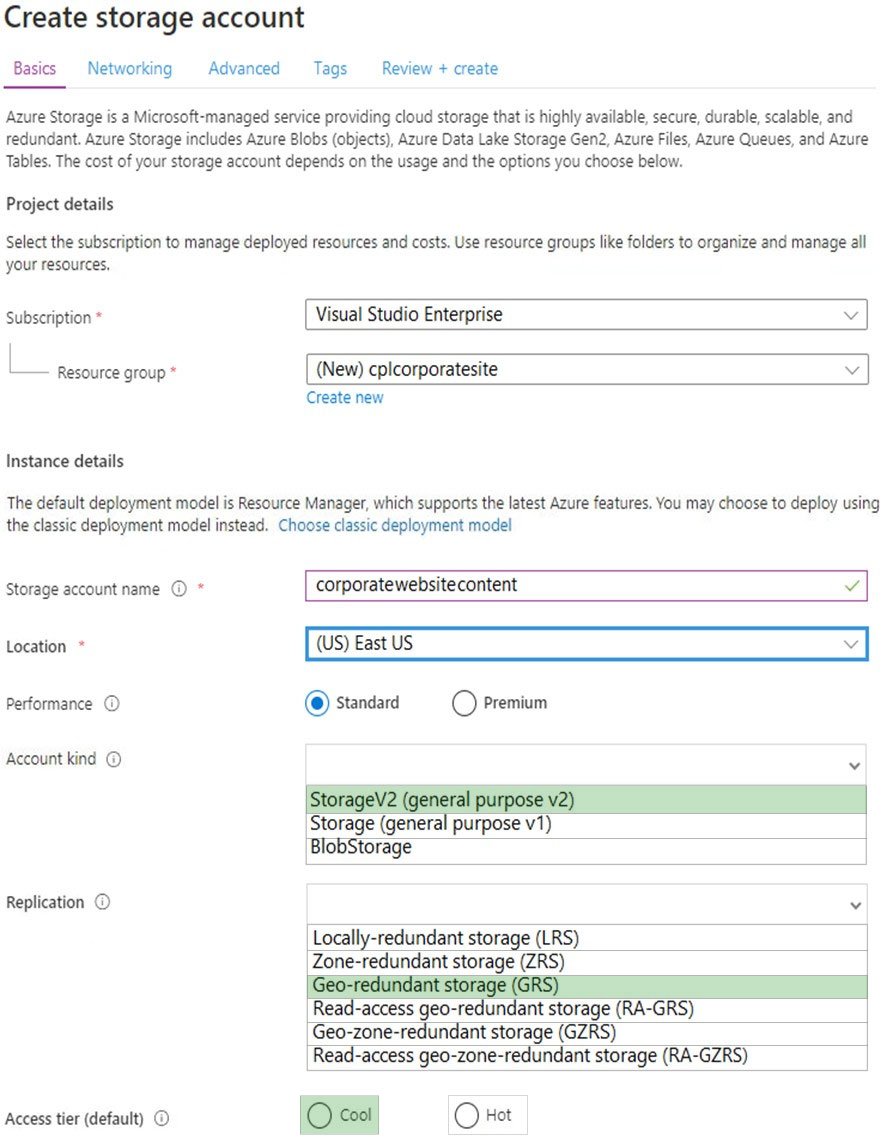
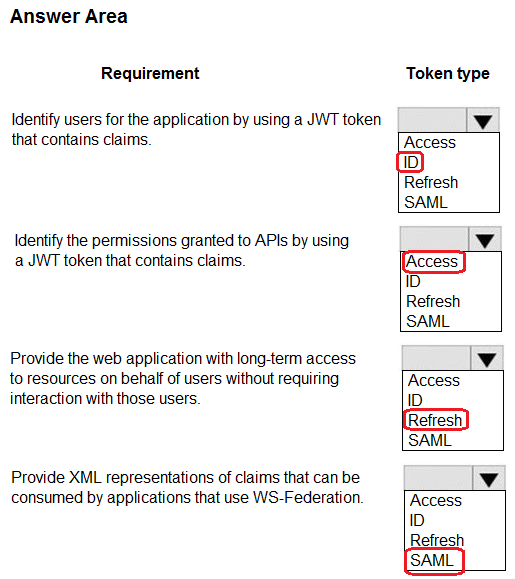
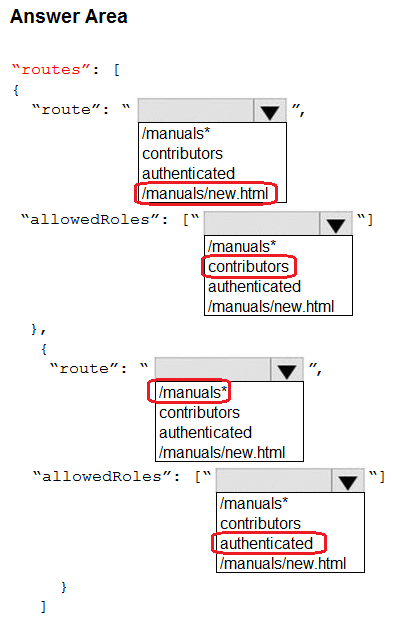
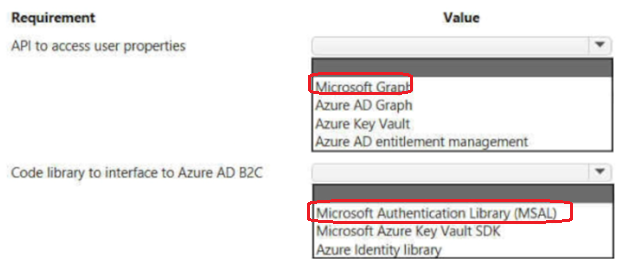
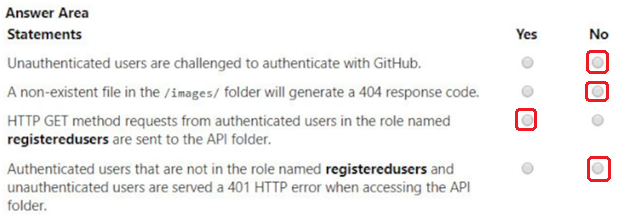
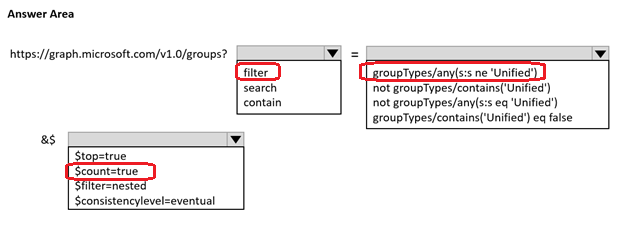
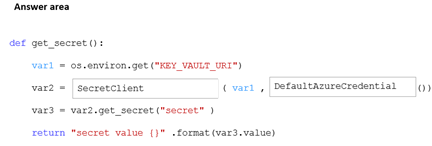
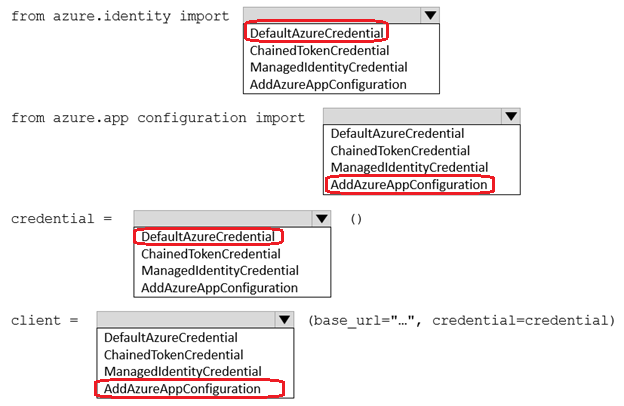
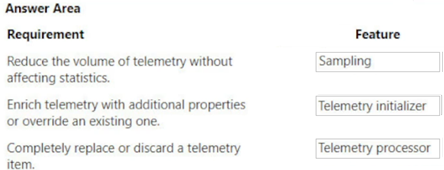

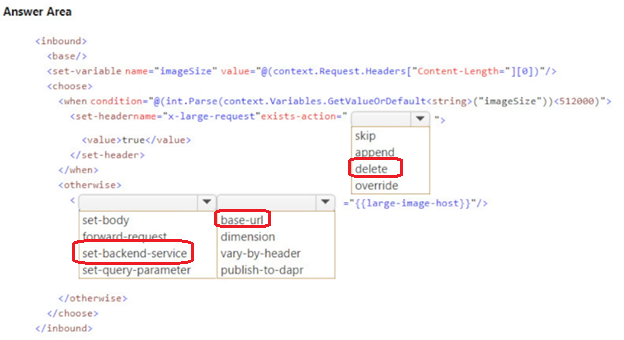
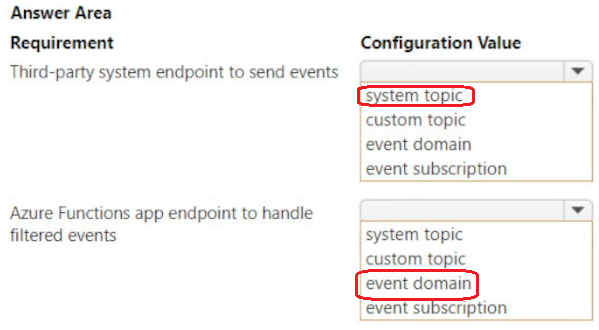




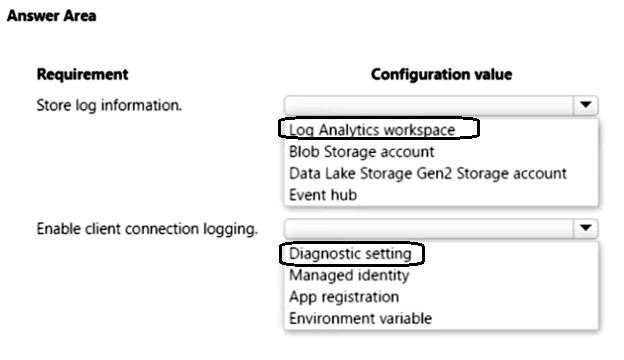








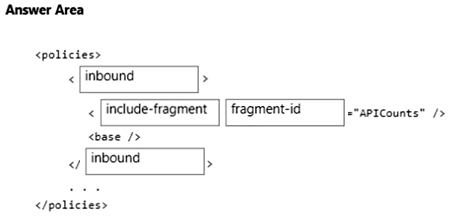
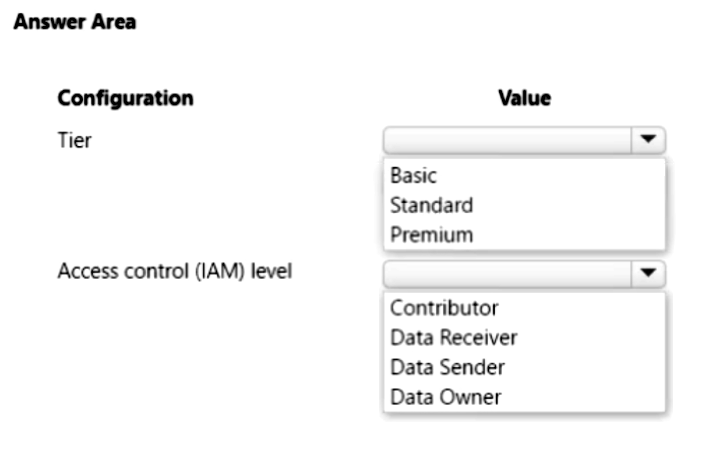
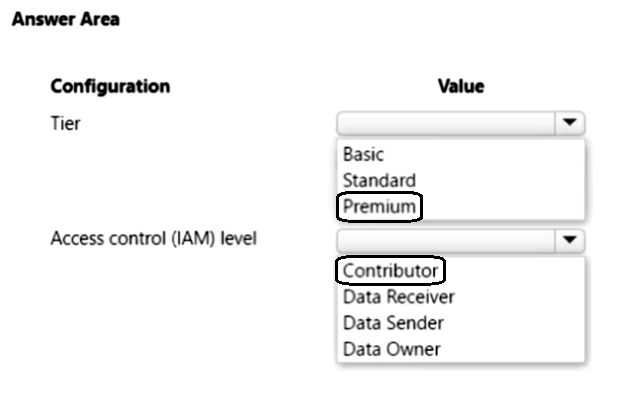
No comments:
Post a Comment